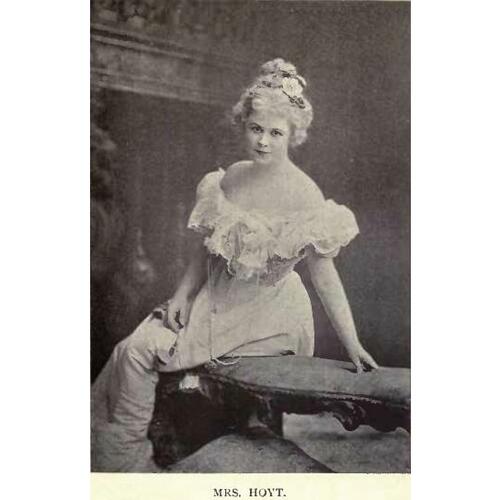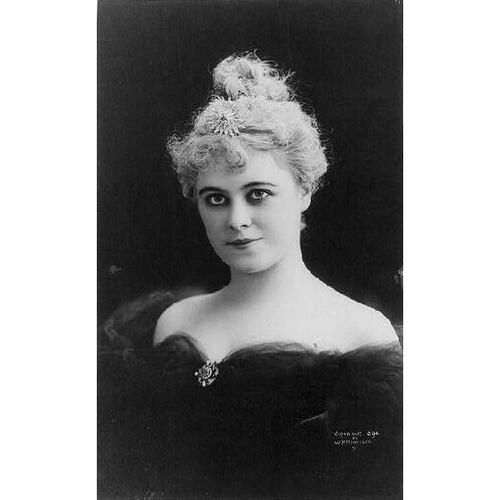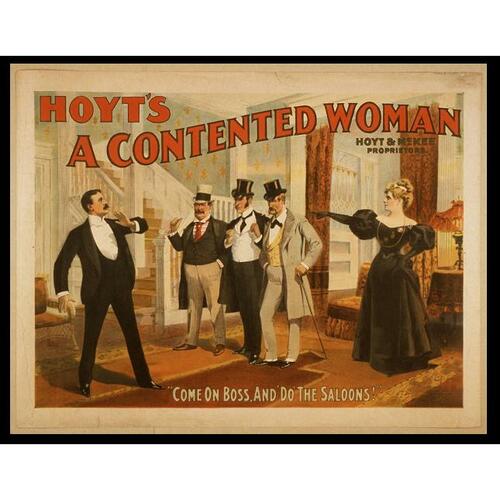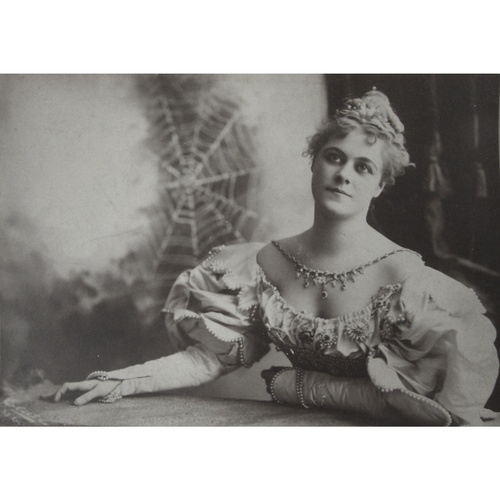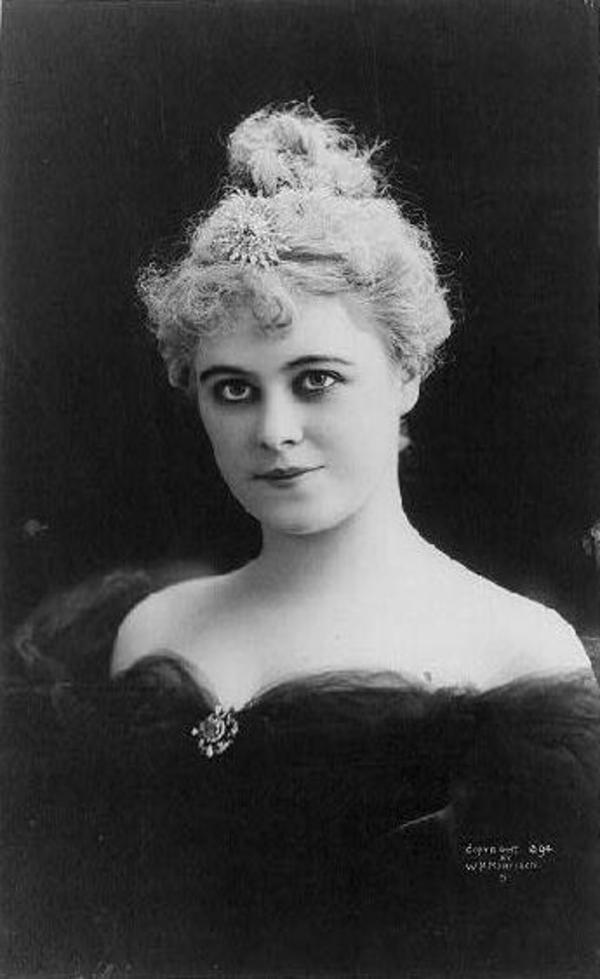
Source: Courtesy of Wikimedia Commons
SCALES, CAROLINE (Hoyt), known as Caroline Miskel and Caroline Miskel-Hoyt, actress; b. 15 Sept. 1873 in Covington, Ky, daughter of Christopher Columbus Scales and Mary Menzies; m. 4 March 1894 Charles Hale Hoyt; d. 2 Oct. 1898 in New York City and was buried in Charlestown, N.H.
Caroline Scales’s father, an editor and former member of the Kentucky legislature, became editor of the Cincinnati Tobacco Journal in 1874. The following year he took his family to live in Toronto, where his father, Joab Scales, a tobacco manufacturer, had relocated after the Civil War. Carrie’s Canadian schooling included the study of elocution with Jessie Alexander; her younger sister, Sarah (Sally), attended Moulton College. By all accounts Carrie ripened into a remarkable beauty. Canadian writer Hector Willoughby Charlesworth* described her “light auburn hair, creamy complexion, bright sapphire eyes, and noble form and features” and noted that she was “as intellectual as she was beautiful.”
Moving to New York to enter the theatre, she changed her name to Caroline Miskel. Her father appears to have become disabled and probably died about this time, and in 1891 her grandfather in Toronto revoked his legacies to her and Sally, possibly because they had become actresses. In that year, at the age of 18, she played her début season with John Augustin Daly’s distinguished repertory company, appearing in new comedies and classic revivals. The following year, on 23 April, the traditional date of Shakespeare’s birth and death, Daly closed his season with As you like it, in which Caroline portrayed Phebe, the comic country shepherdess. She was then seen as Marguerite, supporting that “prince of romantic actors,” Robert Bruce Mantell, in the 1892–93 road tour of Charles Osborne’s The face in the moonlight. Her next role was that of Ruth Hardman, the outcast daughter of a clergyman in Charles Hale Hoyt’s satiric comedy A temperance town, which opened on 17 Sept. 1893 at Hoyt’s Madison Square Theatre in New York. The play gently ridiculed the hypocrisy of prohibition in a small Vermont town and proved to be one of Hoyt’s great money-makers, running on Broadway for 125 performances. The 20-year-old Miskel and the 34-year-old Hoyt fell in love and on 4 March 1894, following the play’s subsequent extensions at several other theatres, they were married. The witty New Hampshire playwright had been elected to his state’s legislature in 1893 and was re-elected in 1895. So, after her marriage, Caroline Miskel-Hoyt retired to support her husband. Unfortunately, their first child was born dead on 4 March 1896.
Caroline returned to Hoyt’s theatre in January 1897 to star “with notable success” in another of his genial satires, A contented woman, which he wrote for her and which poked fun at female suffrage. Her talents as a comic actress were widely recognized and her physical beauty continued to attract attention. In his Annals of the New York stage George Clinton Densmore Odell called her “one of the most beautiful women that ever walked the stage.” William James Thorold, writing about “Canadian successes on the stage” in Massey’s Magazine in 1896, extolled her “bewildering beauty of figure and countenance.” It is Charlesworth who informs us that she “holds a unique place in the history of periodical publications; for she was the very first ‘magazine cover girl.’” A picture of her on Munsey’s Magazine in 1891 “proved immediately and enormously successful.”
On 2 Oct. 1898, in New York, Caroline died suddenly at 25. Most accounts say she perished the day after giving birth to a second stillborn child; according to the New York Times she was taken by an “attack of acute kidney trouble.” Haunted by a curious pattern of deaths – his mother, business partner, two wives, and children – her husband was “completely crushed” and suffered a severe depression. Eventually hospitalized and briefly committed to an asylum, he passed away in 1900. He was buried in a mausoleum at Charlestown with Caroline and his first wife, actress Flora Walsh, who had died in 1892, also at an early age.
NA, RG 31, C1, 1881, Toronto, St James Ward: 55 (mfm. at MTRL). W. J. Thorold, “Canadian successes on the stage,” Massey’s Magazine (Toronto), 2 (July–December 1896): 236–37. Kentucky Post (Covington), 3–5 Oct. 1898. New York Times, 3 Oct. 1898, 21 Nov. 1900. Types of Canadian women (Morgan). H. [W.] Charlesworth, Candid chronicles: leaves from the note book of a Canadian journalist (Toronto, 1925). D. L. Hunt, “Introduction” to C. H. Hoyt, Five plays, ed. D. L. Hunt (Princeton, N.J., 1941), i–xv; “The life and work of Charles H. Hoyt” (phd thesis, Vanderbilt Univ., Nashville, Tenn., 1942). G. C. D. Odell, Annals of the New York stage (15v., New York, 1927–49), 15: 5, 349, 600–1, 780.
Cite This Article
David Gardner, “SCALES, CAROLINE (Hoyt) (Caroline Miskel, Caroline Miskel-Hoyt),” in Dictionary of Canadian Biography, vol. 12, University of Toronto/Université Laval, 2003–, accessed December 21, 2024, https://www.biographi.ca/en/bio/scales_caroline_12E.html.
The citation above shows the format for footnotes and endnotes according to the Chicago manual of style (16th edition). Information to be used in other citation formats:
| Permalink: | https://www.biographi.ca/en/bio/scales_caroline_12E.html |
| Author of Article: | David Gardner |
| Title of Article: | SCALES, CAROLINE (Hoyt) (Caroline Miskel, Caroline Miskel-Hoyt) |
| Publication Name: | Dictionary of Canadian Biography, vol. 12 |
| Publisher: | University of Toronto/Université Laval |
| Year of publication: | 1990 |
| Year of revision: | 1990 |
| Access Date: | December 21, 2024 |


